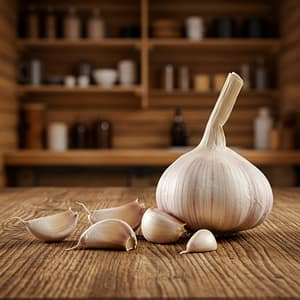- Home
- Garlic

A. Scientific Name:
Allium sativum
B. What it is:
Garlic is a bulb vegetable widely used as a seasoning and traditional wellness ingredient. It is easy to grow and supports sustainable home gardening.
C. Found in everyday products:
Cooking ingredients
Seasoning powders
Supplements
Herbal remedies
D. Why do people use it?:
Garlic is used for flavor and traditional health support. It is a natural ingredient in cooking and home remedies.
E. Safety summary:
Normal culinary use is safe.
Precautions:
• Strong garlic may irritate the stomach.
• May interact with blood thinners.
F. Good for:
Flavorful cooking
Traditional remedies
Balanced diets
G. Be careful if:
You take blood thinners
You have sensitive digestion
H. DIY / Usage Ideas:
Add to soups
Roast whole garlic
Make garlic oil
I. Natural alternative category:
Onion
Ginger
Turmeric
